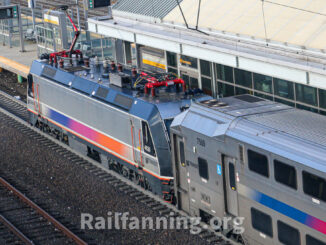WASHINGTON — The House of Representatives has approved legislation that proponents say will improve the Nation’s intercity passenger rail system and the safety of the nation’s railroads.
The Rail Safety Improvement Act of 2008 and the Passenger Rail Investment and Improvement Act of 2008 will increase funding for Amtrak over the next five years, require new safety controls on trains that help reduce crashes, allow states to regulate solid waste processing facilities along rail lines and allocate funding for improvements to Washington’s Metro transit system.
The legislation sets “an aggressive deadline” of 2015 for implementation of positive train control (PTC) across most of the rail network, Edward R. Hamberger, President and CEO of the Association of American Railroads said in a statement. Hamberger promised that “the freight railroad industry is committed to doing everything it can to ensure that PTC is implemented effectively and safely,” but admitted it would be a challenge.
“Nothing is more important to the railroad industry than the safety of our employees and the communities we serve,” Hamberger added. “Although 2007 was the industry’s safest year in history, we recognize that there is always room for improvement. Provisions of the new safety legislation will help facilitate even more improvements in safety.”
The rail legislation includes the Amtrak reauthorization bill which was developed from similar bills passed by the Senate last year (70-22) and passed by the House earlier this year (311-94). The bill:
— Authorizes $13.06 billion over five years for passenger rail— more than $2.6 billion annually for Amtrak, intercity passenger rail, and high speed rail programs, which is almost double what the U.S. is currently spending
— Requires reforms at Amtrak, including a new Board of Directors, improved accounting and financial planning, and new standards for service reliability and on-time performance.
— Requires a collaborative plan for bringing the Northeast Corridor to a state-of-good-repair by 2018
— Authorizes the Surface Transportation Board to fine freight railroads for delaying Amtrak trains.
— Requires Amtrak stations to comply with disability accessibility standards and authorize funding for such improvements.
The legislation also includes the Railroad safety improvement bill which was developed from similar bills passed unanimously by the Senate and by the House (377-38). The bill:
— Mandates positive train control (PTC) technology on passenger and certain hazmat rail main lines by 2015 and authorize $250 million in Federal grants for PTC installation.
— Guarantees a 12-hour work period and minimum 10-hour disruption-free rest period for train crews and signal employees.
— Limit the amount of time a rail worker may be in “limbo time.”
— Requires a Federal study and regulation on use of cell phones and other device distractions in locomotive cabs.
— Requires risk-based safety programs for all major railroads to prevent deaths and injuries.
— Creates a National Transportation Safety Board office to assist families of passengers following rail disasters.
Also, the Washington Metropolitan Area Transit Authority (WMATA) reauthorization bill, included in this bloated piece of legislation, authorizes $1.5 billion over 10 years for rehabilitation and improvements to Washington D.C.’s rail transit system.
“We are grateful to our entire Congressional delegation and others in Congress who understand the importance of protecting the substantial investment the federal government and the National Capital region have made in the Metro system,” said Metro General Manager John Catoe following passage of the bill. “Metro is an asset designed to serve the federal workforce and the National Capital Region.
“A safe, secure, and reliable Metro system is also a critical component for ensuring the continuity of federal operations during an emergency,” Catoe added.
Also included is the Clean Railroads Act of 2008 which allows states to clean up solid waste processing facilities on rail sites, which have avoided regulation through a loophole in Federal law and applies state standards for air pollution, water pollution and fire safety to transfer facilities handling and storing solid waste in open dumps.
“Today is a transformative and historic moment in our Nation’s transportation system, because we passed legislation improving intercity passenger rail service and enhancing a transportation solution that is affordable, accessible, and environmentally sustainable,” said Rep. James L. Oberstar, D-Minn. “… This legislation greatly increases safety standards for the rail industry, which is good news for rail workers and the general public.”
The bill now goes to the Senate.



